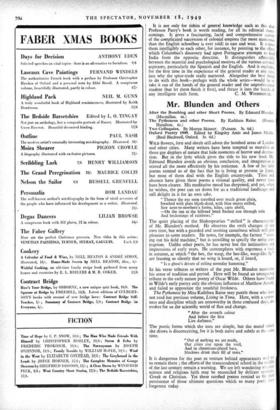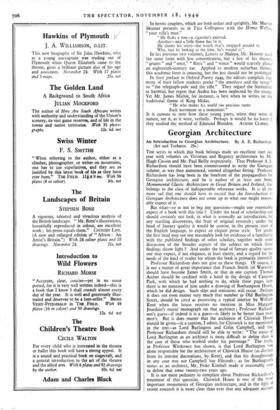Mr. Blunden and Others .
After the Bombing and other Short Poems. By Edmund Standen. (Macmillan. 6s.)
The Pythoness and other Poems. By Kathleen Raine. Hamilton. 6s.)
Two Colloquies. By Martyrs Skinner. (Putnam. 3s. 6d.) Oxford Poetry 1949. Edited by Kingsley Amis and James Midi:. (Basil Blackwell, Oxford. 3s. 6d.) Wtu) flowers, fern and shrub still adorn the bombed areas of London and other cities. Many writers have been tempted to moralise on those gay displays of nature that hide moments of horror and de,tru,:- tion. But in the lyric which gives the title to his new book Mr. Edmund Blunden avoids an obvious conclusion, and imagination it stirred all the more effectively by his reticence. A few of his later poems remind us of the fact that he is living at present in Japan, but most of them deal with the English countryside. Time and absence have given these poems a visional quality, and never have hues been clearer. His meditative mood has deepened, and yet, when he wishes, the poet can set down for us a traditional landscape and still delight in it for its own sake.
" Thence the eye soon travelled over much green plain,
Swathed with plats blush-dyed, with blue meres stelled, Saw next-to-nowhere's farms, kilns, carts afield, —On the inn at the hillroad bend flashed sun through rain And beckonings of rainbows."
The quiet placing of the Shakespearian "stelled" is characteristic' of Mr. Blunden's method. He observes the swift changes of out own time, but with a guarded and seeming casualness which will give pleasure to some readers. He notes, for example, the farmer " steer- ing out his field machine," but is unwilling to specify the noisy con- traption. Unlike other poets, he has never lost the intimations and impressions of early years. He contemplates with eagerness a bat in autumn, at which " the bee, the wasp, the bee-like, wasp-like fly" are feasting so silently that no wing is heard, or, if heard,
" Is a ghost's dream of toiling noonday humming."
In his verse tributes to writers of the past Mr. Blunden maintain; his sense of tradition and period. Here will be found an unexpected tribute to the early nature poetry of Oscar Wilde. Others have found in Wilde's early poetry only the obvious influence of Matthew Arnold, and failed to appreciate the youthful freshness. The Pythoness by Miss Kathleen Raine may puzzle those who have not read her previous volume, Living in Time. Here, with a spare- ness and discipline which are noteworthy in these confused day'., sh: evokes for us the scientific world of flux and change.
" After the seventh colour And before the first Lies darkness."
The poetic forms which she uses are simple, but the moral which she draws is disconcerting, for it is both naive and subtle at the same
time.
" Out of nothing we are made, Our cities rise upon the void,
And in chromium-plated bars, Shadows drink their fill of tears."
It is dangerous for the poet to venture behind appearances and try to remain there ; the efforts of the transcendental school in the Imddie of the last century remain a warning. We are left wondering wil:Lhcr science and religious faith may be reconciled by delicate symbol', Greek or Christian. Yet these rarefied poems remind us by their persistence of those ultimate questions which so many poet, hare forgotten today.
In heroic couplets, which are both sedate and sprightly, Mr. Martyn Skinner presents us in Two Colloquies with the HOMO WeThu, " your villa's man."
" He flicks a box—a cigarette's emitted. Another—and a little flame has lit it.
He shoots his wrist—the watch that's strapped around it.
Why, just by looking at the time, he's wound it." In his previous two volumes, Letters to Malaya, Mr. Skinner used the same form with less concentration, but a few of his rhyme,, " grunts " and " once," " flints " and " wince " would scarcely pleas: an eighteenth-century car. Applied to modern suburban themes, this academic form is amusing, but the jest should not be prolonged. In their preface to Oxford Poetry too, the editors complain that many of their fellow students prefer " the amethyst and the syrup" to " the telegraph-pole and the rifle." They regard the Surrealists as harmful, but regret that Auden has been neglected by the young. Yet Mr. James Michie, for instance, is best when he writes on the traditional theme of King Midas. " He who makes his world too precious turns
Each movement to a monument."
It is curious to note how these young poets, when they write of nature, see it, as it were, verbally. Perhaps it would be no harm if they studied the method of Edmund Blunden. AUSTIN CLARKE.















































































 Previous page
Previous page